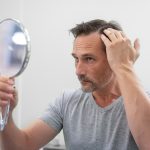
Which Nutritional Deficiencies Can Cause or Worsen Hair Loss?
Have you noticed sudden and significant hair loss, even if your family history suggests otherwise? Although the most common type of hair loss (androgenetic alopecia) is often inherited, other factors can contribute to hair loss.
Many of our clients are surprised to learn that diet and nutritional deficiencies can play a role in your hair woes. Keep reading as we explore the relationship between nutritional deficiencies and hair loss, plus the effective solutions our team uses to help you reclaim your locks.
Hair loss and nutrition: What to watch out for
Maintaining a balanced diet is crucial for your overall health, so it’s no surprise that when your diet is deficient in key nutrients, the health of your hair suffers. Put another way, a healthy diet prevents deficiencies of vital vitamins and minerals and keeps your hair nourished.
Everyone’s body is different, so if you suspect your diet is playing a role in your hair loss, consult with our expert, Dr. Maag. Our team evaluates your symptoms and explores the possible role a lack of key nutrients plays in your hair loss.
While you wait for your appointment, here’s a look at some of the most common nutritional deficiencies and how they cause or worsen hair loss:
Protein: The foundation of healthy hair
Protein plays a vital role in overall hair health, as your hair structure consists predominantly of this essential macronutrient. However, excessive or inadequate protein intake can lead to hair-related issues.
Most of people consume more than two times the recommended daily amount of protein, so it’s unlikely you’re deficient in this nutrient. Excessive protein intake, however, can result in a biotin deficiency, causing hair loss.
Minerals: The building blocks of strong hair
The minerals iron, zinc, and selenium are crucial for maintaining healthy hair. Iron deficiency can lead to anemia, which can mean your hair follicles don’t get the nutrients they need, and your hair growth cycle gets disrupted.
Moreover, selenium deficiencies impact scalp and hair follicle health, while insufficient zinc levels can contribute to acute and chronic hair loss. Incorporating foods like nuts, lentils, and dark leafy greens can help maintain the right mineral levels and support your hair health.
Vitamins: Hair growth boosters
Maintaining the right balance of vitamins is essential for healthy hair growth. Imbalances can trigger or worsen hair loss. Excessive vitamin A intake, for instance, can disrupt the hair growth cycle and result in sudden hair loss.
On the other hand, vitamin B7 (biotin) deficiency leads to brittle hair and increased hair shedding. Getting enough vitamin C is necessary to absorb iron, and if you don’t consume enough, you can make iron deficiency-induced hair loss worse.
To stay on top of your hair health, be sure to include vitamin-rich fruits and vegetables in your diet.
Help for thinning hair
Whether your thinning hair is because of nutritional deficiencies or another reason, at Honest Hair Restoration, we empathize with the challenges losing your hair brings.
From your initial consultation to the final steps of your hair restoration journey, our team provides unwavering support and guidance. Depending on your personal needs and preferences, our team may recommend one or a combination of the following hair restoration treatments:
- Prescription-strength medications
- Regenerative treatments (like PRP therapy)
- Low-level laser treatments
- NeoGraft® assisted ProGrowth follicular unit extraction (FUE) hair transplants
Struggling with thinning hair? Learn about your treatment options by scheduling a consultation online or at the location most convenient to you.





